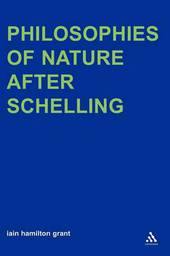
|
Philosophies of Nature after Schelling
Paperback / softback
Main Details
| Title |
Philosophies of Nature after Schelling
|
| Authors and Contributors |
By (author) Iain Hamilton Grant
|
| Series | Transversals: New Directions in Philosophy |
|---|
| Physical Properties |
| Format:Paperback / softback | | Pages:246 | | Dimensions(mm): Height 234,Width 156 |
|
| Category/Genre | Philosophy |
|---|
| ISBN/Barcode |
9781847064325
|
| Classifications | Dewey:113 |
|---|
| Audience | | Postgraduate, Research & Scholarly | |
|---|
|
Publishing Details |
| Publisher |
Bloomsbury Publishing PLC
|
| Imprint |
Continuum International Publishing Group Ltd.
|
| Publication Date |
23 October 2008 |
| Publication Country |
United Kingdom
|
Description
'The whole of modern European philosophy', wrote F.W.J. Schelling in 1809, 'has this common deficiency - that nature does not exist for it.' Despite repeated echoes of Schelling's assessment throughout the natural sciences, and despite the philosophy of nature recently proposed but not completed by Gilles Deleuze, Philosophies of Nature After Schelling argues that Schelling's verdict remains accurate two hundred years later. Presenting a lucid account of Schelling's major works in the philosophy of nature alongside those of his scientific contemporaries who pursued and furthered that work, this book does not simply aim to present Schelling's extravagant 'speculative physics' as an historical episode. Rather, Schelling's programme is presented as a viable and necessary corrective both to the rejection of metaphysics and the correlative 'antiphysics' at the ethical heart of contemporary philosophy.
Author Biography
Iain Hamilton Grant is Senior Lecturer in Philosophy at the University of the West of England. He has written widely on post-Kantian European philosophy and is translator of Lyotard's Libidinal Economy and Baudrillard's Symbolic Exchange and Death.
Reviews"Philosophies of Nature after Schelling is an important, indeed a groundbreaking work." - Joseph P. Lawrence, College of the Holy Cross, Notre Dame Philosophy Review, May 10, 2007 "Iain Hamilton Grant's book Philosophies of Nature after Schelling proposes that we think about nature as irreducible to the entire dichotomous game of self and world, idealism and realism. Indeed, Grant argues for a reconsideration of "nature" in terms of the classical notion of phusis-this is a 'physics' that is less concerned with quasi-verifiable, smallest units of matter and more a physics in the sense of a dynamical and ideational flux that pervades the very correlation of self and world, idea and thing." -Eugene Thacker, Leonardo/ISAST, 2009 'Intriguing and ambitious...Philosophies of Nature After Schelling sets a new standard for Schelling scholarship. More than this, it is an important work of philosophy in its own right.' - Radical Philosophy 144 (July/August 2007) * Radical Philosophy *
|